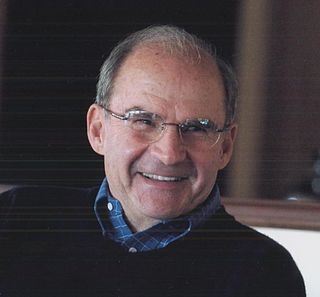A Quote by Jamie Goode
It is science that brings us an understanding of the true complexity of natural systems. The insights from the science of ecology are teaching us how to work with the checks and balances of nature, and encouraging a new, rational, limited-input, environmentally sound means of vineyard management that offers a third way between the ideologically driven approach of Biodynamics and conventional chemical-based agricultural systems.
Quote Topics
Related Quotes
New laws, new kinds of things can emerge as the universe evolves. The more moving parts you have in something, the more possibilities there are. There's a whole new science now of complexity, and what we see is that complexity requires a very different approach than the kind of bottom-up approach that fundamental physics has always used. We're gonna have to think about the world in a different way if we want to address complex systems.
How can you communicate your thoughts or demonstrate your hypotheses by conventional means when all the values and standards that you want to challenge are built into those means? Science and new technology today like to declare that they encourage 'lateral thinking,' new ways of seeing and putting data together - but all systems have an inbuilt resistance to what has not been programmed into them through the premises on which their rules are based.
It is clear that while science provides insights into the complexity of the world around us, those insights...present a fractured mosaic rather than a seamless whole. There are profound limits to science that must be recognized if we are to minimize the destructive consequences of using the powers provided by scientific discovery.
Over time, I started becoming more aware of the vastness and complexity of the universe, which led me away from any sort of conventional Christianity. I still love the teachings of Christ, but I also believe that the human condition prevents us from having any true objective knowledge of the universe. All human belief systems are inherently flawed. If I had to label myself now, I'd call myself a Taoist-Christian-agnostic quantum mechanic. Also, there's nothing in the actual Bible that limits a Christian in their interest in science. Anti-science is a function of ignorant fundamentalism.
To reduce modern climate change to one variable, CO2, or a small proportion of one variable - human-induced CO2 - is not science. To try to predict the future based on just one variable (CO2) in extraordinarily complex natural systems is folly. Yet when astronomers have the temerity to show that climate is driven by solar activities rather than CO2 emissions, they are dismissed as dinosaurs undertaking the methods of old-fashioned science.
A second possible approach to general systems theory is through the arrangement of theoretical systems and constructs in a hierarchy of complexity, roughly corresponding to the complexity of the "individuals" of the various empirical fields... leading towards a "system of systems." [...] I suggest below a possible arrangement of "levels" of theoretical discourse...(vi) [...] the "animal" level, characterized by increased mobility, teleological behavior and self-awareness...
If somebody is working on a new medicine, computer science helps us model those things. We have a whole group here in Seattle called the Institute for Disease Modelling that is a mix of computer science and math-type people, and the progress we're making in polio or plans for malaria or really driven by their deep insights.
I agree that science is the best way of understanding the natural world, and therefore that we have reason to believe what the best science tells us about the objects in that world and the relations between them. But this does not mean that the natural world is the only thing we can have true beliefs about. The status of material objects as things that are "real" is a matter of their having physical properties, such as weight, solidity, and spatio-temporal location. In order to be real, such things need not have, in addition to these properties, some further kind of metaphysical existence.


































